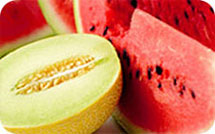
Did you know that cantaloupe is at greater risk of contamination because of its unique netted rind? The spaces between the netting can trap bacteria and make them harder to remove.
A total of 499 whole cantaloupe samples were collected and tested for Salmonella. One sample was found to be unsatisfactory due to the presence of Salmonella bacteria.
- The Canadian Food Inspection Agency (CFIA) initiated a food safety investigation as a result of this unsatisfactory result, which led to a product recall (currently available at Library and Archives Canada).
- No illnesses associated with the consumption of any of this product were reported.
CFIA’s targeted survey focused on Salmonella and represents part of the collection of over 3,500 cantaloupe samples over five years (2008/2009 – 2012/2013).
- 99.8 per cent of whole cantaloupe samples tested negative for the presence of Salmonella.
“The vast majority of cantaloupes in the Canadian market are produced and handled under good agricultural and manufacturing practices. However, cantaloupe contamination with Salmonella could sporadically occur. Consumers should follow these safety tips when choosing to purchase and consume cantaloupes and other melons.”
Canadian Food Inspection Agency
Contact Info:
- Canadian Food Inspection Agency (CFIA):
- 1-800-442-2342,
- TTY 1-800-465-7735;
- 8:00 a.m. to 8:00 p.m. Eastern time, Monday to Friday,
- or contact CFIA by filling out the online feedback form.
NEWS RELEASE
More than 99% of whole cantaloupe samples negative for Salmonella
Food Safety Action Plan targeted survey
April 4, 2014 – Ottawa, ON – Canadian Food Inspection Agency
As part of the Canadian Food Inspection Agency’s (CFIA) routine testing of various food products, a study released today found that 99.8 per cent of whole cantaloupe samples tested negative for the presence of Salmonella.
A total of 499 whole cantaloupe samples were collected and tested for Salmonella bacteria, which can cause a serious illness with long-lasting effects. One sample was found to be unsatisfactory due to the presence of Salmonella. The CFIA initiated a food safety investigation as a result of this unsatisfactory result, which led to a product recall (currently available at Library and Archives Canada). No illnesses associated with the consumption of any of this product were reported.
The CFIA has identified cantaloupes as one of the priority commodity groups of fresh fruits and vegetables for enhanced surveillance. This targeted survey focused on Salmonella and represents part of the collection of over 3,500 cantaloupe samples over five years (2008/2009 – 2012/2013). The CFIA continues its surveillance activities and will make public its findings when available.
The overall finding of this survey suggests that the vast majority of cantaloupes in the Canadian market are produced and handled under good agricultural and manufacturing practices. However, cantaloupe contamination with Salmonella could sporadically occur. Consumers should follow these safety tips when choosing to purchase and consume cantaloupes and other melons at Healthy Canadians.
Quick Facts
- Cantaloupes can become contaminated with pathogens in production, harvest, post-harvest handling, processing and distribution.
- The presence of pathogens in cantaloupes creates potential risk for foodborne illnesses as cantaloupes are consumed raw.
- Once contaminated, the bacteria can be difficult to remove due to the rough surface of the melon which provides areas for bacterial attachment and protection from sanitization.
Related Products
2010-2011 Salmonella in Cantaloupes – Executive Summary
Associated Links
Chemical Residues / Microbiology Targeted Surveys
—————————————————
You may also want to know:
- Third List of Recalled Castle Cheese Inc.’s Products: Okanagan’s Choice Cheese Brand Shredded Cheese
- Toronto CNE Food-Borne Illnesses: Cause is Contaminated Maple Bacon Jam Topping on The Cronut Burger
